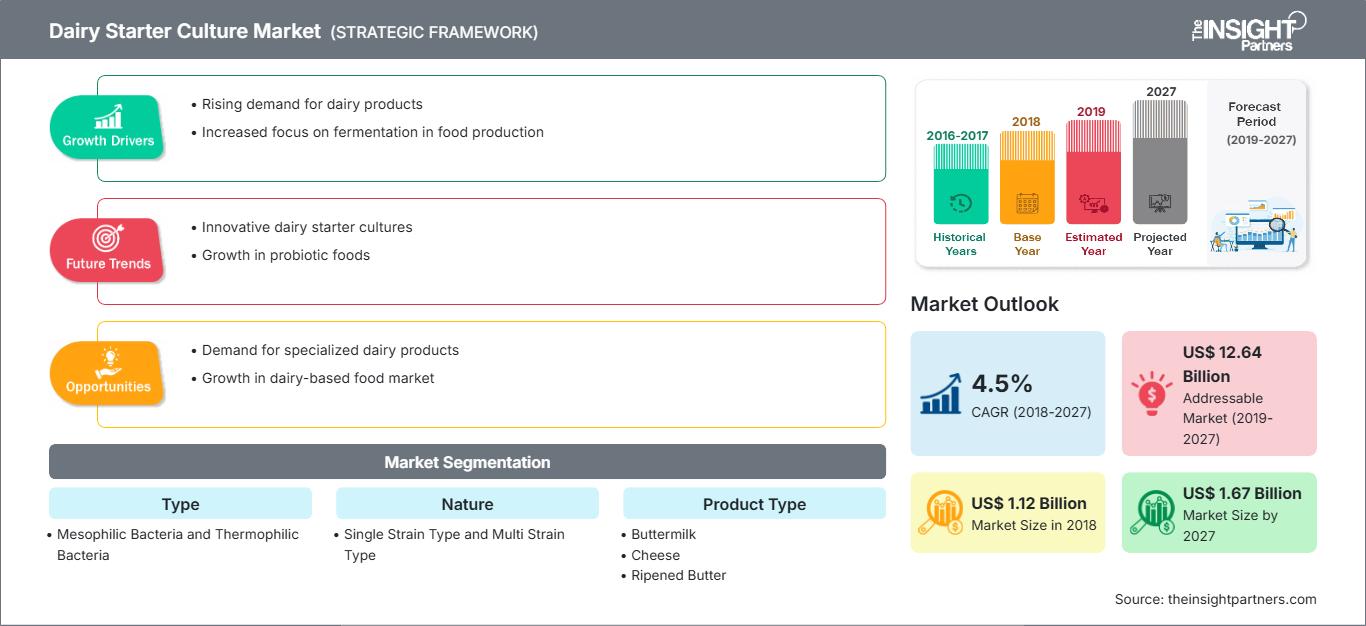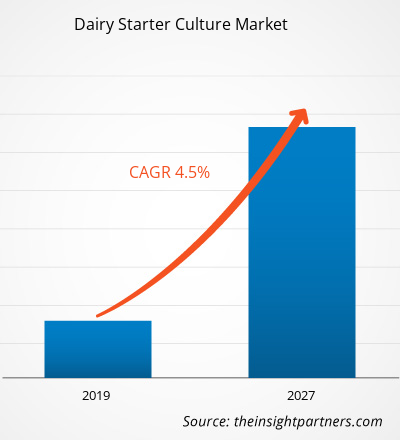[研究报告]2018年,乳制品发酵剂市场价值为11.243亿美元,预计到2027年将达到16.702亿美元;预计2021年至2027年的复合年增长率为4.5%。
乳制品发酵剂是指添加到牛奶中以达到最佳产品稠度的微生物。乳制品发酵剂是在微生物发育和发酵过程中添加的。此外,乳糖(乳糖)产生的乳酸会降低pH值,从而保持牛奶的浓稠度,从而推动全球乳制品发酵剂市场的发展。
预计欧洲乳制品发酵剂市场在预测期内将以最高的复合年增长率增长。该地区市场的增长主要归功于其成熟的乳制品行业。不同类型的发酵乳制品在欧洲越来越受欢迎。德国和法国是牛奶、奶酪等乳制品的主要生产国,在欧盟占据主导地位。欧盟的奶酪消费和生产对发酵剂市场产生了重大影响,而发酵剂对于延长保质期以支持向其他地区的出口至关重要。欧洲乳制品品种繁多,是推动市场增长的关键因素,因为发酵剂可用于奶酪、发酵乳制品、酒精饮料以及肉类和海鲜产品。
欧洲对乳制品发酵剂的需求不断增长,吸引了众多制造商在该地区建立业务,这进一步推动了欧洲乳制品发酵剂市场的增长。
自定义此报告以满足您的要求
您将免费获得任何报告的定制,包括本报告的部分内容,或国家级分析、Excel 数据包,以及为初创企业和大学提供超值优惠和折扣
乳制品发酵剂市场: 战略洞察

- 获取本报告的主要市场趋势。这个免费样本将包括数据分析,从市场趋势到估计和预测。
您将免费获得任何报告的定制,包括本报告的部分内容,或国家级分析、Excel 数据包,以及为初创企业和大学提供超值优惠和折扣
乳制品发酵剂市场: 战略洞察

- 获取本报告的主要市场趋势。这个免费样本将包括数据分析,从市场趋势到估计和预测。
新冠疫情对乳品发酵剂市场的影响
受新冠疫情影响,乳品发酵剂市场在 2020 年经历了名义增长,随后需求略有下降。由于原材料生产放缓、供应链不稳定、酒店、餐馆和咖啡馆关闭,市场正受到新冠疫情的干扰。此外,持续的新冠疫情彻底改变了乳品发酵剂行业的增长状况,因为许多国家的酒店、餐馆和咖啡馆已完全关闭。市场洞察
新兴经济体日益增强的健康意识预计将推动乳品发酵剂市场的增长
市场洞察
新兴经济体日益增强的健康意识预计将推动乳品发酵剂市场的增长
市场对安全乳制品的意识和需求不断增长,迫使制造商通过加入乳品发酵剂成分来生产高质量的乳制品。添加乳制品发酵剂可以改善乳制品的口感、质地和色泽,从而达到所需的稠度。由于对高品质乳制品的需求,预计预测期内乳制品发酵剂市场将大幅增长。此外,由于在乳制品中添加发酵剂微生物具有多种健康益处,例如预防胃肠道感染、抗致癌作用、缓解便秘、降低血清胆固醇、增强免疫系统和抗过敏特性,预计全球乳制品发酵剂市场在不久的将来将会增长。
类型洞察
根据类型,乳制品发酵剂市场分为中温菌和嗜热菌。嗜热菌在 2018 年占据了较大的市场份额。嗜热菌是一种嗜极菌,可在 41 至 122 °C(106 至 252 °F)的相对高温下茁壮成长。嗜热菌会在高温下生存,而其他细菌或古菌在相同条件下即使没有被杀死也会受到损害。嗜热菌发酵剂会降低乳制品的pH值,防止腐败微生物的生长,并刺激脱水收缩。这对于酸奶至关重要,因为它能提供口感和稠度。因此,预计所有这些都将在预测期内推动对乳制品发酵剂的需求。
自然洞察
基于自然,乳制品发酵剂市场分为单菌株类型和多菌株类型。多菌株类型在2018年占据了最大的市场份额。全球乳制品发酵剂市场由多菌株类型细分市场主导。使用多种发酵剂菌株可以延长产品的保质期,并提供适合烘焙产品的膨胀特性。因此,多菌株领域的使用预计将刺激全球乳制品发酵剂行业的增长。
乳制品发酵剂市场中的一些参与者包括 BDF Natural Ingredients SL
Biolacter, Inc、Chr. Hansen Holding A/S、CSK food enrichment BV、Dalton Biotecnologie SRL
Dohler Group、陶氏化学公司、Lallemand Inc.、LB Bulgaricum 和 Sacco System 等。关键公司实施并购和研发战略,以扩大客户群并在全球市场上获得显着份额,这也使他们能够在全球范围内维护自己的品牌名称。
报告重点
- 乳制品发酵剂市场中的渐进式行业趋势,帮助参与者制定有效的长期战略
- 发达市场和发展中市场采用的业务增长战略
- 2019 年至 2027 年乳制品发酵剂市场的定量分析
- 全球乳制品发酵剂需求估计
- PEST 分析以说明行业中买家和供应商的有效性
- 了解竞争激烈的市场状况的最新发展
- 市场趋势和前景以及推动和抑制乳制品发酵剂市场增长的因素
- 通过强调支撑商业利益的市场策略来协助决策过程,从而促进市场增长
- 乳制品发酵剂市场规模各个节点
- 市场详细概述和细分,以及乳品发酵剂行业动态
- 各地区乳品发酵剂市场规模及增长潜力
乳制品发酵剂市场区域洞察
The Insight Partners 的分析师已详尽阐述了预测期内影响乳制品发酵剂市场的区域趋势和因素。本节还探讨了北美、欧洲、亚太地区、中东和非洲以及南美和中美洲的乳制品发酵剂市场细分和地域分布。
乳制品发酵剂市场报告范围
| 报告属性 | 细节 |
|---|---|
| 市场规模 2018 | US$ 1.12 Billion |
| 市场规模 2027 | US$ 1.67 Billion |
| 全球复合年增长率 (2018 - 2027) | 4.5% |
| 历史数据 | 2016-2017 |
| 预测期 | 2019-2027 |
| 涵盖的领域 |
By 类型
|
| 覆盖地区和国家 | 北美
|
| 市场领导者和主要公司简介 |
|
乳制品发酵剂市场参与者密度:了解其对业务动态的影响
乳制品发酵剂市场正在快速增长,这得益于终端用户需求的不断增长,而这些需求的驱动因素包括消费者偏好的不断变化、技术进步以及对产品优势的认知度不断提高。随着需求的增长,企业正在扩展产品线,不断创新以满足消费者需求,并抓住新兴趋势,从而进一步推动市场增长。

- 获取 乳制品发酵剂市场 主要参与者概述
乳制品发酵剂市场 - 按类型
- 中温菌
- 嗜热菌
乳制品发酵剂市场 - 按性质
- 单菌株类型
- 多菌株类型
乳制品发酵剂市场 - 按产品类型
- 酪乳
- 奶酪
- 成熟黄油
- 酸奶油
- 酸奶
- 其他
乳制品发酵剂市场 - 按产品类型
- 酪乳
- 奶酪
- 成熟黄油
- 酸奶油
- 酸奶
- 其他
乳制品发酵剂市场 -按功能划分
- 酸生产
- 香料生产
- 其他
公司简介
- BDF Natural Ingredients SL
- Biolacter, Inc
- Chr. Hansen Holding A/S
- CSK food浓缩 BV
- Dalton Biotecnologie SRL
- Dohler Group
- 陶氏化学公司
- Lallemand Inc.
- LB Bulgaricum
- Sacco System
- 历史分析(2 年)、基准年、预测(7 年)及复合年增长率
- PEST和SWOT分析
- 市场规模、价值/数量 - 全球、区域、国家
- 行业和竞争格局
- Excel 数据集
近期报告
客户评价
购买理由
- 明智的决策
- 了解市场动态
- 竞争分析
- 客户洞察
- 市场预测
- 风险规避
- 战略规划
- 投资论证
- 识别新兴市场
- 优化营销策略
- 提升运营效率
- 顺应监管趋势




















 获取免费样品 - 乳制品发酵剂市场
获取免费样品 - 乳制品发酵剂市场